将来时的表达方式
将来时态的常见表达方式例词

将来时态的常见表达方式例词将来时态是英语语法中的一种时态,用于表示将来发生的动作或事件。
在英语中,有多种方式可以表达将来时态。
下面是一些常见的将来时态表达方式及相应的例词。
1. 将来进行时 (Future Continuous)将来进行时用于表示在将来某个时间正在进行的动作或事件。
例词:Tomorrow at this time, I will be studying for my exam.2. 将来完成时 (Future Perfect)将来完成时用于表示将来某个时间已经完成的动作或事件。
例词:By the end of next year, she will have visited five different countries.3. 将来完成进行时 (Future Perfect Continuous)将来完成进行时用于表示将来某个时间开始并持续到这一时间的动作或事件。
例词:By the time you arrive, I will have been waiting for two hours.4. 使用情态动词 (Using Modal Verbs)情态动词可以用于表示将来时,常见的情态动词有will,shall,can,may等。
例词:She will go to the party tonight.5. 使用going to结构 (Using "going to" structure)"going to"结构用于表示根据现有证据或计划将要发生的动作或事件。
例词:I am going to buy a new car next month.6. 使用现在时态 (Using Present Tense)有时,将来时态可以用现在时态来表示,特别是当时间表或日程已经确定。
例词:The train leaves at 7:30 tomorrow morning.7. 使用时间状语从句 (Using Time Clauses)时间状语从句可以用于表示将来时态,常见的引导词有when,after,before等。
英语语法:一般将来时解释集

英语语法:一般将来时解释大全一、基本定义一般将来时是英语时态的一种,表示将来的动作或状态。
它主要用于描述未来的计划、预测或期望发生的事情。
二、形式构成一般将来时的构成主要有以下几种形式:1. 基本结构:主语+ will /shall + 动词原形+ 其他成分。
这是最基本的一般将来时形式,表示将来的动作或状态。
2. be going to 结构:主语+ be(am, is, are)going to + 动词原形+ 其他成分。
这种结构表示计划或安排将要发生的事情,也可以表示根据目前的迹象或情况预测将会发生的事情。
3. be+动词不定式:主语+ be(am, is, are)to + 动词原形+ 其他成分。
这种结构表示计划或安排将来要做的事情。
4. be+动词ing:主语+ be(am, is, are)+ 动词ing形式+ 其他成分。
这种结构表示即将发生的动作,通常与“when”连用。
5. be+表示时间的介词短语:主语+ be(am, is, are)+ 表示时间的介词短语。
这种结构用于表示将来某个时间点的情况。
6. 将来时间状语:tomorrow, next week, in the future等以上就是一般将来时的主要构成形式。
需要注意的是,在具体使用时,应根据语境和上下文选择合适的构成方式。
三、用法场景1. 表达未来的计划或意图,例如:I will go to the beach next summer.2. 描述未来的预测或期望,例如:It will rain this afternoon.3. 在条件句中表示将来的结果,例如:If you study hard, you will pass the exam.四、与其他时态的区别1. 与现在进行时态的区别:现在进行时态强调正在进行的动作,而一般将来时态强调将来的动作或状态。
2. 与过去时态的区别:过去时态表示过去的动作或状态,与将来时间无关。
英语动词的将来时

英语动词的将来时摘要英语动词的将来时是用来表示将来某一时刻或某一段时间内发生的动作或状态,或者表示对将来的打算、预测、安排等。
英语动词的将来时有多种表达方式,主要有以下六种:will/shall + 动词原形be going to + 动词原形be + to + 动词原形be about to + 动词原形be + 现在分词一般现在时这六种表达方式有不同的含义和用法,需要根据语境和语气来选择合适的一种。
本文将分别介绍这六种表达方式的定义、结构、用法和例句,并用表格来对比它们的异同。
1. will/shall + 动词原形1.1 定义will/shall + 动词原形是一种最常用的表示将来时的方式,它可以表示即将发生的动作或状态,或者表示对将来的打算、意愿、决定、预测等。
1.2 结构will/shall + 动词原形的结构如下:人称肯定句否定句一般疑问句特殊疑问句第一人称单数I shall/will do I shall not/will not do Shall/Will I do?What shall/will I do?第二人称单数You will do You will not do Will you do?What will you do?第三人称单数He/She/It will do He/She/It will not do Will he/she/it do?What will he/she/it do?第一人称复数We shall/will do We shall not/will not do Shall/Will we do?What shall/will we do?第二人称复数You will do You will not do Will you do?What will you do?第三人称复数They will do They will not do Will they do?What will they do?1.3 用法will/shall + 动词原形的用法如下:表示即将发生的动作或状态,常与表示将来时间的状语连用,如 tomorrow, next week, in the future 等。
将来时态的结构
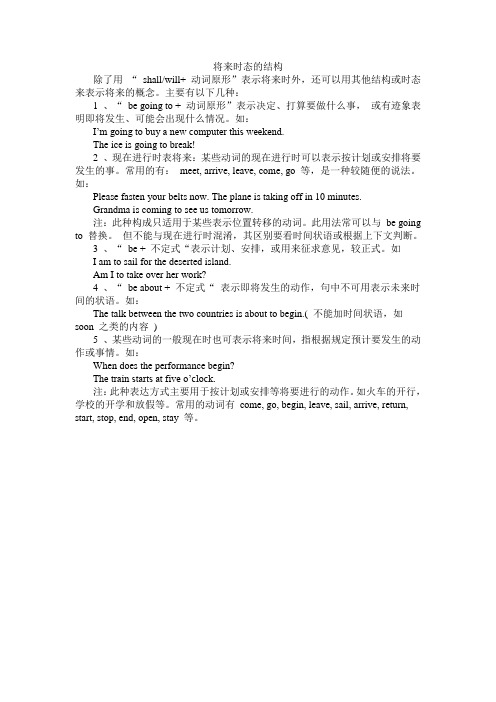
将来时态的结构除了用“shall/will+动词原形”表示将来时外,还可以用其他结构或时态来表示将来的概念。
主要有以下几种:1、“be going to + 动词原形”表示决定、打算要做什么事,或有迹象表明即将发生、可能会出现什么情况。
如:I’m going to buy a new computer this weekend.The ice is going to break!2、现在进行时表将来:某些动词的现在进行时可以表示按计划或安排将要发生的事。
常用的有:meet, arrive, leave, come, go等,是一种较随便的说法。
如:Please fasten your belts now. The plane is taking off in 10 minutes.Grandma is coming to see us tomorrow.注:此种构成只适用于某些表示位置转移的动词。
此用法常可以与be going to 替换。
但不能与现在进行时混淆,其区别要看时间状语或根据上下文判断。
3、“be + 不定式“表示计划、安排,或用来征求意见,较正式。
如I am to sail for the deserted island.Am I to take over her work?4、“be about + 不定式“表示即将发生的动作,句中不可用表示未来时间的状语。
如:The talk between the two countries is about to begin.(不能加时间状语,如soon之类的内容)5、某些动词的一般现在时也可表示将来时间,指根据规定预计要发生的动作或事情。
如:When does the performance begin?The train starts at five o’clock.注:此种表达方式主要用于按计划或安排等将要进行的动作。
如火车的开行,学校的开学和放假等。
将来时的几种表达方式

7.将来进行时
• will+be+doing表示将来某一时刻正在 进行的动作。 • 明天此时我应该在和老师谈话。 • I’ll be talking with the teacher this time tomorrow.
• Eg:will u be free next week? • Sorry, I ___a meeting from Monday to Friday. • A have had B will be having • C have D will have had
3.be+to do表达按职责、义务要求即 将发生的动作。 • 法国总统将于六月访华 • The French President is to visit China in June. • 你必须9点以前回来。 • You are to be back by 9o’clock.
4.Be about to do刚要 ,正要做(表 示非常近的将来)
• 注意:此结构一般不与具体的时间状语连 用,但可用于be about to do…when…意思 是“正要做…这时”
瞬间动词
• 瞬间动词,也叫终止性、结束性动词。 表示动作的结果,或表示短暂性、一次性 的动作。如:close, leave, buy, join, become, begin, fall(掉下),fall ill(病倒), get to(know), come, go, see, hear, hear from, catch a cold等。 • 这类动词可以用于完成时,但在一般情况 下,不能加上表示一段时间的状语或疑问 词。
• • • •
Eg:u should not go anywhere,the train___. A will leave B. is leaving C leaves D.is to leave. 答案B. Leave is 趋向动词,用现在进行时 表示将来。
初中英语一般将来时的四种表达方法
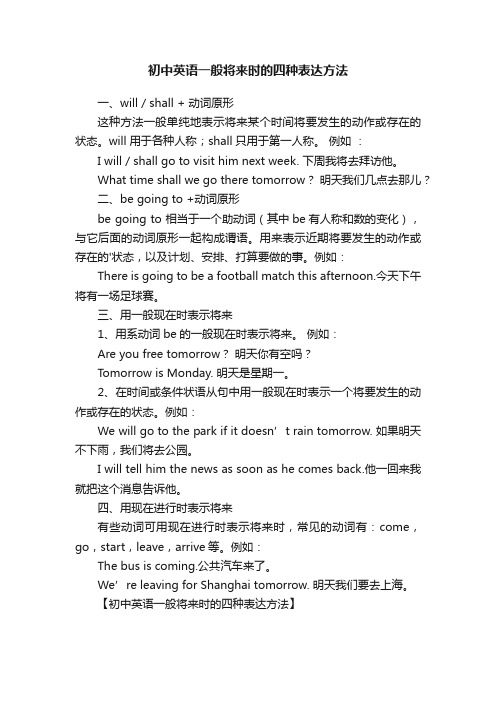
初中英语一般将来时的四种表达方法一、will / shall + 动词原形这种方法一般单纯地表示将来某个时间将要发生的动作或存在的状态。
will用于各种人称;shall只用于第一人称。
例如:I will / shall go to visit him next week. 下周我将去拜访他。
What time shall we go there tomorrow?明天我们几点去那儿?二、be going to +动词原形be going to 相当于一个助动词(其中be有人称和数的变化),与它后面的动词原形一起构成谓语。
用来表示近期将要发生的动作或存在的'状态,以及计划、安排、打算要做的事。
例如:There is going to be a football match this afternoon.今天下午将有一场足球赛。
三、用一般现在时表示将来1、用系动词be的一般现在时表示将来。
例如:Are you free tomorrow?明天你有空吗?Tomorrow is Monday. 明天是星期一。
2、在时间或条件状语从句中用一般现在时表示一个将要发生的动作或存在的状态。
例如:We will go to the park if it doesn’t rain tomorrow. 如果明天不下雨,我们将去公园。
I will tell him the news as soon as he comes back.他一回来我就把这个消息告诉他。
四、用现在进行时表示将来有些动词可用现在进行时表示将来时,常见的动词有:come,go,start,leave,arrive等。
例如:The bus is coming.公共汽车来了。
We’re leaving for Shanghai tomorrow. 明天我们要去上海。
【初中英语一般将来时的四种表达方法】。
将来时态的种种用法及几种时态区别
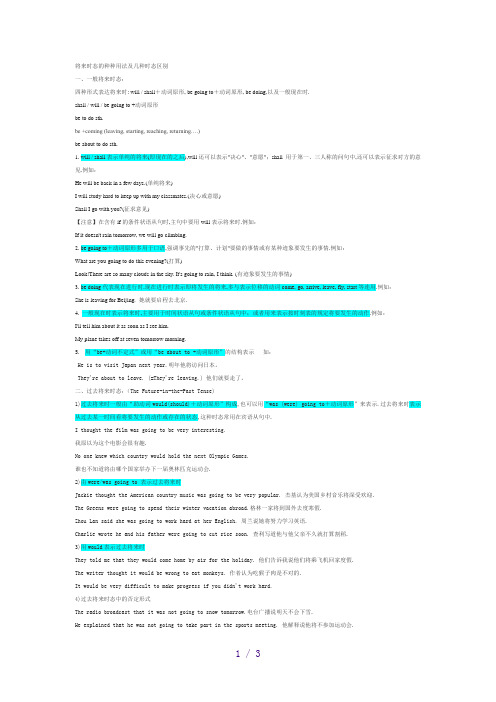
将来时态的种种用法及几种时态区别一、一般将来时态:四种形式表达将来时: will / shall+动词原形, be going to+动词原形, be doing,以及一般现在时.shall / will / be going to +动词原形be to do sth.be +coming (leaving, starting, reaching, returning….)be about to do sth.1. will / shall表示单纯的将来(即现在的之后),will还可以表示"决心"、"意愿";shall 用于第一、三人称的问句中,还可以表示征求对方的意见.例如:He will be back in a few days.(单纯将来)I will study hard to keep up with my classmates.(决心或意愿)Shall I go with you?(征求意见)【注意】在含有if的条件状语从句时,主句中要用will表示将来时.例如:If it doesn't rain tomorrow, we will go climbing.2. be going to+动词原形多用于口语,强调事先的"打算、计划"要做的事情或有某种迹象要发生的事情.例如:What are you going to do this evening?(打算)Look!There are so many clouds in the sky. It's going to rain, I think. (有迹象要发生的事情)3. be doing代表现在进行时.现在进行时表示即将发生的将来,多与表示位移的动词come, go, arrive, leave, fly, start等连用.例如:She is leaving for Beijing. 她就要启程去北京.4. 一般现在时表示将来时,主要用于时间状语从句或条件状语从句中;或者用来表示按时刻表的规定将要发生的动作.例如:I'll tell him about it as soon as I see him.My plane takes off at seven tomorrow morning.5.用“be+动词不定式”或用“be about to +动词原形”的结构表示如:He is to visit Japan next year.明年他将访问日本。
高一英语语法(2-3):动词的时态之一般将来时、过去将来时和将来完成时
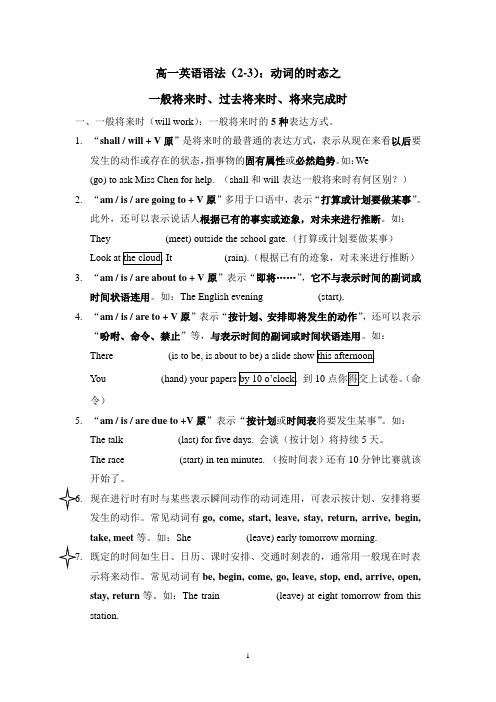
高一英语语法(2-3):动词的时态之一般将来时、过去将来时、将来完成时一、一般将来时(will work):一般将来时的5种表达方式。
1.“shall / will + V原”是将来时的最普通的表达方式,表示从现在来看以后要发生的动作或存在的状态,指事物的固有属性或必然趋势。
如:We __________ (go) to ask Miss Chen for help. (shall和will表达一般将来时有何区别?)2.“am / is / are going to + V原”多用于口语中,表示“打算或计划要做某事”。
此外,还可以表示说话人根据已有的事实或迹象,对未来进行推断。
如:They __________ (meet) outside the school gate.(打算或计划要做某事)(根据已有的迹象,对未来进行推断)3.“am / is / are about to + V原”表示“即将……”,它不与表示时间的副词或时间状语连用。
如:The English evening __________ (start).4.“am / is / are to + V原”表示“按计划、安排即将发生的动作”,还可以表示“吩咐、命令、禁止”等,与表示时间的副词或时间状语连用。
如:到10(命令)5.“am / is / are due to +V原”表示“按计划或时间表将要发生某事”。
如:The talk __________ (last) for five days. 会谈(按计划)将持续5天。
The race __________ (start) in ten minutes. (按时间表)还有10分钟比赛就该开始了。
现在进行时有时与某些表示瞬间动作的动词连用,可表示按计划、安排将要发生的动作。
常见动词有go, come, start, leave, stay, return, arrive, begin, take, meet等。
将来时态的常见表达方式

将来时态的常见表达方式将来时态是英语语法中一个非常重要的时态,用来表示将来发生的动作、事件或状态。
在英语中,将来时态有多种表达方式,本文将逐一介绍常见的几种表达方式。
1. 使用will + 动词原形将来时态最常见的表达方式是使用"will"加上动词的原形。
例如:- I will go to the party tomorrow.(明天我将去参加派对。
)- They will start a new project next week.(他们将在下周开始一个新项目。
)这种方式适用于大多数情况,表示在说话时或者将来某个具体时间会发生的事情。
2. 使用be going to + 动词原形另一种表示将来的方式是使用"be going to"结构,后面加上动词的原形。
通常用来表示计划、打算或者有迹象表明将来会发生的事情。
例如:- She is going to visit her grandparents next month.(她计划下个月去拜访她的祖父母。
)- It looks like it's going to rain.(看起来要下雨了。
)3. 使用现在进行时态有时候我们可以使用现在进行时态表示将来即将发生的动作。
例如:- We are leaving for Paris tomorrow.(我们明天将去巴黎。
)- They are getting married next month.(他们下个月将结婚。
)这种方式常用于已经确定的未来安排或者计划。
4. 使用时间状语词除了上述的方式之外,我们还可以使用时间状语词来表示将来时态。
常见的时间状语词包括:tomorrow(明天)、next week(下周)、in the future(将来)、soon(不久后)等等。
例如:- Jenny will start her new job tomorrow.(珍妮明天将开始新工作。
将来时的几种表达方式

B.——Please bringmeacup oftea .请给我端杯茶来。
——I’ll do itin aminute .我马上就去(端)。
(3)begoingto常含有“即将”之意;而will即可表示“即将”又可表示“较长时间后的未来”,或不表示任何特定的将来时间概念。例如:
A. What are you going to do nextSunday ?
下星期天你打算干什么?
B. She’sgoingto be a teacher.她打算当一名教师。
C.Thewall isgoingtobebrushedwhite.
这面墙将刷成白色。
(2)表示有迹象表明将要发生某种情况,一般指客观事态的发展,而不是表示主观的意图。句中的主语可以指人,也可指物,或者非人称代词it。例如:
Iwill be comingtomorrow.Willyoube coming?我明天来,你来吗?(will在句中单纯表示将来)
这一结构还表示不久或势必要发生的动作,例:
The trainwill be arrivingsoon.火车很快就到站了。
I’llbemeetingyounextyear.我明年与你再见面。或表示将来某一时刻或某一段时间正在进行的动作,例:
A.We’regoingtovisitthefactory.
我们即将去参观那家工厂。
B.He’ll writeabook one day.
他有朝一日要写书。
C.The housewillbreak down.
A.Lookat theseblackclouds.—It’s goingtorain.
将来时的用法

将来时的用法将来时用来表示动作或状态将发生在现在以后的时间。
英语中有多种表示将来时的结构和形式,以下是常用的几种形式和用法:1. will/shall + 动词原形这是最常用的将来时表达方式,表示将来某个时间发生的动作或状态。
例句:- I will go to the beach tomorrow.(我明天会去海滩。
)- She will be here soon.(她马上就到。
)2. be going to + 动词原形这种形式表示根据当前情况,某个动作或状态几乎肯定会发生。
例句:- They are going to have a party next week.(他们下周要开个派对。
)- It looks like it's going to rain.(看起来要下雨了。
)3. 现在进行时将来时可以通过现在进行时来表示将要发生的动作。
例句:- I am meeting my friends for lunch tomorrow.(明天我要和朋友们吃午饭。
)- She is leaving on a business trip next week.(她下周要出差。
)4. 将来进行时表示将来某个时间正在进行的动作,需要用到will/shall be + 现在分词。
例句:- They will be studying for exams all night.(他们将会彻夜备考。
)- I shall be working late tomorrow.(明天我要工作到很晚。
)需要注意的是,对于一些固定的计划、安排或事实,如公共交通时间表、日程安排等,可以使用现在时来表示将来时间。
例如:The train leaves at 9 o'clock tomorrow.(明天九点火车开车。
)。
未来时英语语法
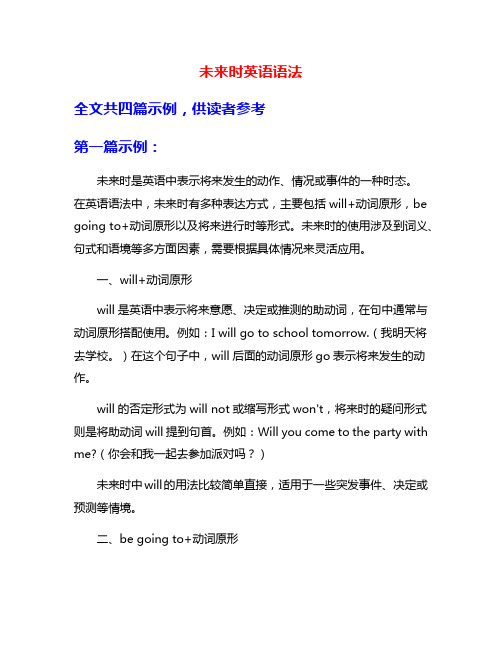
未来时英语语法全文共四篇示例,供读者参考第一篇示例:未来时是英语中表示将来发生的动作、情况或事件的一种时态。
在英语语法中,未来时有多种表达方式,主要包括will+动词原形,be going to+动词原形以及将来进行时等形式。
未来时的使用涉及到词义、句式和语境等多方面因素,需要根据具体情况来灵活应用。
一、will+动词原形will是英语中表示将来意愿、决定或推测的助动词,在句中通常与动词原形搭配使用。
例如:I will go to school tomorrow.(我明天将去学校。
)在这个句子中,will后面的动词原形go表示将来发生的动作。
will的否定形式为will not或缩写形式won't,将来时的疑问形式则是将助动词will提到句首。
例如:Will you come to the party with me?(你会和我一起去参加派对吗?)未来时中will的用法比较简单直接,适用于一些突发事件、决定或预测等情境。
二、be going to+动词原形be going to是英语中表示将来打算、计划或预测的另一种方式,通常用来表达已经有了决定或安排的将来事项。
例如:She is goingto visit her grandparents next week.(她下周将去拜访她的祖父母。
)在这个句子中,be going to后面的动词原形visit表示将来计划发生的动作。
be going to+动词原形常用于现在已有计划或打算的情况,语气更确切。
三、将来进行时未来进行时是英语中表示将来某一时刻正在进行的动作或情况的时态形式。
将来进行时由助动词will/shall+be+现在分词构成。
例如:They will be studying English at this time tomorrow.(明天这个时候他们将在学习英语。
)在这个句子中,助动词will后面的be+现在分词studying表示将来进行的动作。
专升本英语般将来时的几种表达方式

用于表示计划或安排,如:I will go to the library tomorrow.
表示临时安排或临时打算
添加标题
添加标题
添加标题
添加标题
用于表示将来的可能性,如“It may rain tomorrow.”
用于表示临时的、未确定的计划或打算,如“I'll go to the library tomorrow.”
例子:I will be studying for the exam tomorrow.
注意事项:be doing结构中的be动词要与主语的人称和数保持一致。
be about to do
含义:表示即将发生的动作或状态
结构:主语+be about to+动词原形
例句:He is about to leave.
一般将来时通常使用will或shall+动词原形,而过去将来时通常使用would或should+动词原形。
一般将来时通常用于表示计划、打算、预测等,而过去将来时通常用于表示过去的计划、打算、预测等。
一般将来时通常用于表示将来的可能性,而过去将来时通常用于表示过去的可能性。
注意时间状语的使用
一般将来时通常用于表示将来的动作或状态,时间状语通常为"tomorrow"、"next week"等。
注意语境:根据上下文和语境选择合适的表达方式
注意语气:根据说话者的态度和情感选择合适的表达方式
注意时态:一般将来时表示将来发生的动作或状态,注意与现在时、过去时的区别
注意语态:一般将来时既可以表示主动语态,也可以表示被动语态,注意根据语境选择合适的语态
06
一般将来时的实际应用
你知道表达将来的六种方式吗
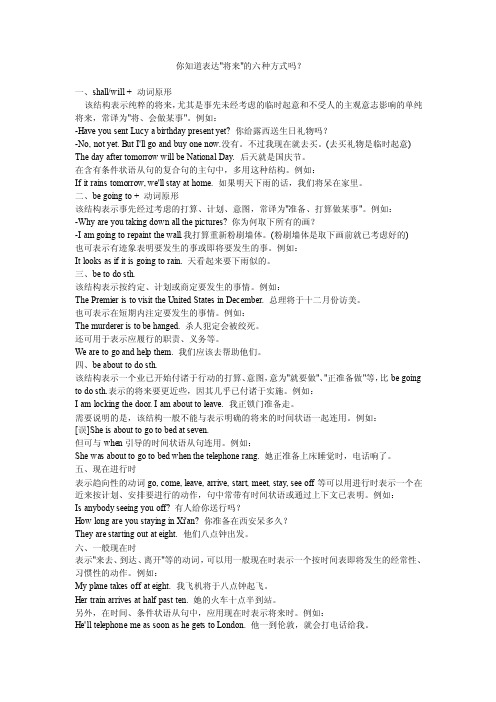
你知道表达"将来"的六种方式吗?一、shall/will + 动词原形该结构表示纯粹的将来,尤其是事先未经考虑的临时起意和不受人的主观意志影响的单纯将来,常译为"将、会做某事"。
例如:-Have you sent Lucy a birthday present yet? 你给露西送生日礼物吗?-No, not yet. But I'll go and buy one now.没有。
不过我现在就去买。
(去买礼物是临时起意) The day after tomorrow will be National Day. 后天就是国庆节。
在含有条件状语从句的复合句的主句中,多用这种结构。
例如:If it rains tomorrow, we'll stay at home. 如果明天下雨的话,我们将呆在家里。
二、be going to + 动词原形该结构表示事先经过考虑的打算、计划、意图,常译为"准备、打算做某事"。
例如:-Why are you taking down all the pictures? 你为何取下所有的画?-I am going to repaint the wall.我打算重新粉刷墙体。
(粉刷墙体是取下画前就已考虑好的)也可表示有迹象表明要发生的事或即将要发生的事。
例如:It looks as if it is going to rain. 天看起来要下雨似的。
三、be to do sth.该结构表示按约定、计划或商定要发生的事情。
例如:The Premier is to visit the United States in December. 总理将于十二月份访美。
也可表示在短期内注定要发生的事情。
例如:The murderer is to be hanged. 杀人犯定会被绞死。
还可用于表示应履行的职责、义务等。
将来时的几种表达方式

一般将来时的几种表达方式一般将来时表小将来某个时间要发生的动作或存在的状态,也表小将来经常或反复发生的动作,常与表示将来的时间状语连用。
例如:tomorrow , tomorrow morning / afternoon , , the day after tomorrow , next year , next month , , from now on (从现在开始),in an hour (一小时后),in two days / weeks,等。
一般将来时的表小方法有以下多种形式:(1)will/shall do表示将来时间时,一般要与表示将来的时间状语连用,或通过一定的上下文来体现将来时间状语。
shall只用丁第一人称,will可以通用丁各种人称。
在I可句中shall常用丁第一人称表示建议或征求对方意见。
例如:A. I shall write you a letter next month .我下个月给你写信。
B. He will come.他会来。
C. Shall we go to the park ?我们去公园好吗?注意:在You and I,或Both of us之后通常用will而不用shall,例:Both of us will be at the meeting tomorrow.明天我们俩都会出席会议。
⑵ will/shall be doing因为在will/shall do中的will/shall也可理解为情态动词,所以有时会难区分它们是将来意义还是情态意义。
在英语口语中我们常用will/shall be doing来表示“单纯的”将来时间。
比较下列句子:I will come tomorrow . Will you come ?我明天来!你来吗?(will 表示意图和请求)I will be coming tomorrow . Will you be coming ?我明天来,你来吗?(will 在句中单纯表小将来)这一结构还表示不久或势必要发生的动作,例:The train will be arriving soon. 火车彳艮快就至U站了。
英语中将来时的几种表现形态

严格地来讲,英语有16中时态,但常用的时态往往只有8种,其中包括一般将来时。
当句子中出现动作发生的具体时间时,使用的是什么时态往往可以一目了然,且学习起来也得心应手,但是时态的难点是不露时间却可以表示各种各样的时态。
在英语中,通常可以通过以下几个方式来表示将来时,有些表达方式不带将来的时间,甚至有些时态看起来都不是一般将来时,但实际上表示的却是将来的活动。
一、一般现在时表将来如果句子中出现将来的时间、或者是从上下文中理解的将来要发生的、或被理解为是一种“习惯”,那么可以用一般现在时表将来时,用来讨论将来的安排,例如:We leave tonight for Atlanta.我们今晚动身去亚特兰大。
Quickly please, children! Class starts in five minutes.快点孩子们!五分钟后开始上课。
The train leaves at 8:43 on Friday.火车星期五8:43发车。
I get up at six o’clock next Tuesday, I have to be in London at 8:00.我下星期二六点起床,我必须在8点到伦敦。
My mother leaves at 4:30 tomorrow afternoon.我妈妈明天下午四点半离开。
Mary and Helen can’t go with me next Wednesday.玛丽和海伦下星期三不能和我一起去。
试比较:Sandra starts work at 8:00.桑德拉8点开始工作。
解析:我们知道桑德拉8点开始工作,所以被认为是一种“习惯”的意思。
John starts work at 10:00 on Friday.约翰星期五10点开始工作。
解析:我们知道这是本周五的一个特殊情况,这是被安排的。
二、现在进行时表将来即使是现在时,现在进行时也可以用来描述将来要发生的活动,特别是提前计划的活动,例如:We're leaving the kids with Louise.我们要把孩子交给露易丝。
- 1、下载文档前请自行甄别文档内容的完整性,平台不提供额外的编辑、内容补充、找答案等附加服务。
- 2、"仅部分预览"的文档,不可在线预览部分如存在完整性等问题,可反馈申请退款(可完整预览的文档不适用该条件!)。
- 3、如文档侵犯您的权益,请联系客服反馈,我们会尽快为您处理(人工客服工作时间:9:00-18:30)。
Unit 3 Travel Journal (Grammar)——将来时的六种表达法1.will/ shall do (will可用于第一、二、三人称,shall只用于第一人称)(1) 这种将来意义常常夹杂着情态意义,即带有说话人的主观态度和看法。
e.g. You will fail the test if you do n’t work hard.(2) 有时既表示将来,也含有“意愿”或“意图”。
e.g. I will meet you at 6 o’clock.(3) 在疑问句中will/ shall还可用来征询听话人的“意图”。
e.g. Will you be at home at seven this evening?--- Will you marry me? --- Yes, I will.2.be going to do(1) 表示“意图”,即打算在将来做某事。
e.g. I’m going to play basketball after school.They are going to marry next month.I’m going to be a doctor.(2) 表示“预见”,即现在已有迹象表明要发生某种情况。
e.g. The sky is so dark. It’s going to rain.△will/ shall do和be going to do(1) 两者都可表示“意图”,有时两者可以互换使用。
e.g. I won’t tell him about it. = I’m not going to tell him about it.(2) 表示“意图”时,be going to do表示的“意图”通常是事先经过考虑的,而will/ shall do所表示的“意图”则是说话时临时想到的,因此在某些特定的语境中,两者不可互换使用。
e.g. --- I’m going to play basketball after school.--- Really? I will go with you.3.be doing这一结构的主要意义是表示按计划、安排即将发生的动作,常用于表示位置转移的动词,如:go, come, leave, start, arrive等,也可用于其它动态动词。
e.g. The plane is taking off at 5:30.How are you going there ------ by air or by train?△be going to do和be doing(1) be going to do和be doing都可表示决定要做某事,两者在某些语境中可以互换使用。
e.g. We are having fish for supper. = We are going to have fish for supper.We are leaving soon. = We are going to leave soon.<1>I’m taking my students to the park on next Sunday.= I’m going to take my students to the park on next Sunday.(2) 如果动词为come或go,在表示将来时,常用be doing结构。
e.g. W e’re going to Shanghai next week. (to是介词)4.be to do(1) 表示按计划、安排即将发生的动作,常见于报纸和广播,用以宣布官方的计划或决定。
e.g. The Queen is to visit Vietnam next month.(2) 表示命令、禁止(否定式)等。
e.g. Since you’ve done something wrong, you are to stand here.If you are late, you are to stand outside the door.Tell her that she is not to be back late.△be doing和be to do都可以表示按计划、安排将要发生的事态,两者常常可互换,但be to do较常用于正式语体。
5.be about to do刚要做某事,正要做某事。
表示非常近的将来,不与表将来的时间副词连用。
e.g. He is about to leave.注意:不可以说He is about to leave tomorrow.△be about to do…when…:正要做……,这时……e.g. He was about to start when it rained.I was about to lock the door when the telephone rang.6.一般现在时(1) 用一般现在时表将来时间,常见于条件状语从句和时间状语从句中。
e.g. I’ll tell her about it if she comes.I’ll give it to you after I return.I’ll call you as soon as I arrive.(2) 在主句中用一般现在时表示将来时间通常指按照时间表或既定日程一定会发生的将来事态。
e.g. Tomorrow is Sunday.She retires next year.When do you take your next exam?△一般现在时表将来时间所暗示的计划比较客观,因而更具有不可变易性,而且一般现在时表将来时间在口气上也比较正式。
<2>1. Ladies and gentlemen, please fasten your seat belts. The plane_____. (2006全国高考题)A. takes offB. is taking offC. has taken offD. took off2. —Are you still busy? (2005年浙江卷)—Yes, I______ my work, and it won’t take long.A. just finishB. am just finishingC. have just finishedD. am just going to finish3. -What would you do if it _____ tomorrow? (2005全国高考题)-We have to carry it on, si nce we’ve got everything ready.A. rainB. rainsC. will rainD. is raining4. --- Did you tell Julia about the result?---Oh, no, I forgot. I her now. (2005全国III )A. will be callingB. will callC. callD. am to call5. Since I won the big prize, my telephone hasn't stopped ringing. People ____to ask how I am going to spend the money. (2005湖南卷)A. phoneB. will phoneC. were phoningD. are phoning6. I will visit you if Father ______ me.A. letB. letsC. is lettingD. will let7. Look out! That tree _____ fall down.A. is going toB. will beC. shallD. would8. My uncle _____ to see me. He'll be here soon.A. comesB. is comingC. had comeD. came9. " When ______ school begin?"" Next Monday. "A. hasB. doesC. didD. is going to10. Every time I _____ there, I will buy him something nice.A. wentB. will goC. goD. have gone11. We won't go unless you ______ soon.A. had comeB. cameC. will comeD. come12. The air liner from Beijing _____ at 3:00 p.m.A. is about to arriveB. has arrivedC. arrivesD. is going to arrive13. I don't know when he ______, but when he ______, I'll let you know.A. will come/comesB. comes/will comeC. comes/comesD. will come/will come14. ---Did you write to Grace last summer?---No, but I'll ______ her over Christmas vacation.A. be seenB. have seenC. be seeingD. to see15. ---I’m going to the States?---How long ___ you___ in the States?A. are; stayedB. are; stayingC. have; stayedD. did; stay16. I’ve won a holiday for two weeks to Florida. I ____ my mum.A.am takingB. have takenC. takeD. will have taken<3>17. Selecting a mobile phone for personal use is no easy take because technology ____ so rapidly.A.will changeB. has changedC. will have changedD. is changing18. --- You’ve left the light on.---Oh, I have. ___ and turn it off.A.I goB. I’ve goneC. I’ll goD. I’m going19. --- Is this raincoat yours?.---No, mine____ there behind the door.A.is hangingB. has hungC. hangsD. hung20. --- What’s that terrible noise?---The neighbours____ for a party.A.have preparedB. are preparingC. prepareD. will prepare21. Because the shop ____, all the T-shirts are sold at half prices.A.has closed downB. closed downC. is closing downD. had closed down22. --- Can I join the club, Dad?--- You can when you ___ a bit old.A.getB. will getC. are gettingD. will have got23. I feel it is your husband who ___ for the spoiled child.A.is to blameB. is going to blameC. is to be blamedD. should blame24. At this time tomorrow, ____ over the Atlantic.A.we’re going to flyB. we’ll be flyingC. we’ll flyD. we’re to fly25. ---Are you still busy?--- Yes, I my work, and it won’t take long.A.just finishB. am just finishingC. have just finishedD. am just going to finish26. ---Did you tell Julia about the result?--- Oh, no, I forgot. I ____ her now.A.will be callingB. will callC. callD. am to call27. ---What are you going to do this afternoon?--- I’m going to the cinema with some friends. The film ___ quite early, so we ___ to the bookstore after that.A.finished; are goingB. finished; goC. finishes; are goingD. finishes; go答案:1—5 BBBBD 6—10 BABBC 11—15 DCACB16—20 ADCAB 21—27 CAABB BC<4>。
